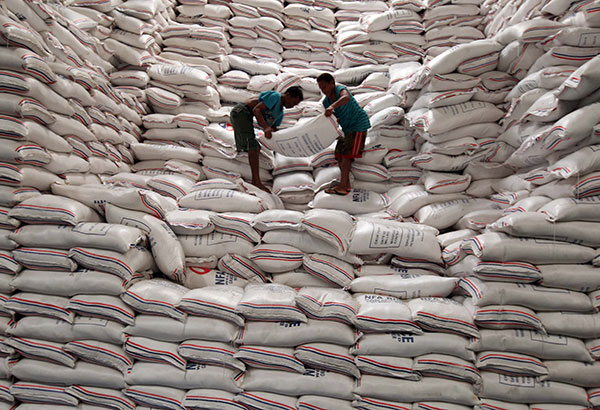Government approves G2P rice imports

Cabinet Secretary Leoncio Evasco, who oversees the operations of the NFA, said the NFA Council approved the importation of rice via government to private scheme (G2P)in a meeting last Monday. He said the decision represented a policy shift from government to government (G2G) rice importation, which he described as “prone to corruption.” File
MANILA, Philippines - President Duterte has allowed the National Food Authority (NFA) to import rice from the private sector to augment its buffer stock for the lean months, an official said yesterday.
Cabinet Secretary Leoncio Evasco, who oversees the operations of the NFA, said the NFA Council approved the importation of rice via government to private scheme (G2P)in a meeting last Monday. He said the decision represented a policy shift from government to government (G2G) rice importation, which he described as “prone to corruption.”
“The NFA will also shift from government-to-government importation to government to private importation (G2P), a move that is more competitive, least corrupt and transparent,” Evasco said in a press conference yesterday in Malacañang.
“Instead of limiting the bidders to government counterparts, private suppliers from participating countries may now be allowed to participate in the bidding, making the whole process covered by the Government Procurement Reform Act unlike the current G2G scheme,” he said.
Evasco said the NFA Council’s decision to adopt the G2P scheme was unanimous. He said Duterte is supportive of the move.
“The President, during the last Cabinet meeting, has been given the opportunity to listen to the position of the NFA Council, that there is a need for us to import. The President said this time, the NFA would no longer have the monopoly of importing rice. We should open the importation through the private sector,” he said.
NFA administrator Jason Aquino was present during the council meeting and was supportive of the decision, Evasco said. Aquino previously called for the importation of rice through the G2G scheme.
The Legislative Executive Development Advisory Council requires the NFA to maintain a rice buffer stock good for 15 days at any given time and 30 days at the onset of the lean months of July to September. The country’s daily consumption rate requirement is 32,720 metric tons or 654,000 bags.
Agriculture Secretary Emmanuel Piñol previously called for the importation of 250,000 metric tons of rice to serve as the country’s buffer stock for the lean months through the G2G scheme. Piñol said the importation should only be done for the lean months and that buying rice from local farmers remains the priority.
Evasco said the NFA would have to continue importing rice until the country becomes rice self-sufficient.
“You know, the Philippines has never been self-sufficient in terms of rice. Since time immemorial, we have been importing rice. There are two modes to import rice. One is government-to-government. Unfortunately this G2G has been abused. This has been used for corrupt practices because there is no bidding involved,” Evasco said.
“We have to make a drastic decision in order to ensure a corrupt-free and competitive bidding process at the NFA. Hence, instead of doing a G2G, the council will push for G2P to increase accountability and transparency,” he said.
Evasco instructed the NFA to ensure that cartels would not manipulate rice prices.
“I’m calling on the NFA management to really guard against the emergence of cartels. After all, it’s the NFA that issues the certification of eligibility and import permits,” the cabinet official said.
Private-led rice importation approved Evasco said the NFA council has also approved the importation of 805,000 metric tons of Minimum Access Volume (MAV) of rice this year. MAV is the volume of commodities allowed to be imported by a member country as ac commitment to the World Trade Organization (WTO).
Aquino previously rejected the extension of rice importation under the MAV scheme, which has been endorsed by the NFA council.
Last month, Duterte fired Evasco’s undersecretary Halmen Valdez, who reviewed the NFA’s decision to deny the importation of rice. Duterte said he could not figure out why Valdez was pushing for importation, which he said would compete with the farmers’ products.
Evasco believes that the policy shift was an acknowledgement that there is really a need for the Philippines to import rice.
- Latest
- Trending
























